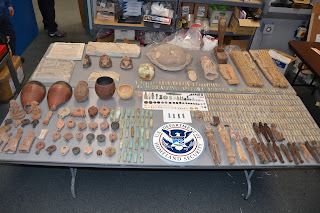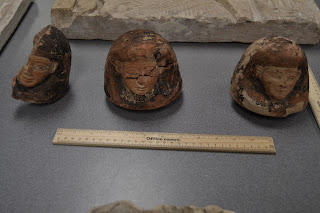Brooklyn Man Indicted for Egyptian Artifact Smuggling. Did COVID-19 Impact Grand Jury Selection?
Man who arrived at JFK Airport and indicted for allegedly possessing illicit Egyptian artifacts had unfair jury panel, defense lawyer suggests.
Now a veteran defense lawyer has challenged the criminal prosecution by suggesting that the COVID-19 outbreak interfered with the selection of a fair grand jury.
Homeland Security Investigations (HSI) arrested Ashraf Omar Eldarir of Brooklyn in February. The court released him on $60,000 bond and placed the case under seal, which has since been lifted.
A grand jury sitting in the Eastern District of New York (E.D.N.Y.) indicted Eldarir five months later
on two counts of smuggling under 18 U.S.C. § 545, alleging:
On or about April 18,2019, within the Eastern District of New York and elsewhere, the defendant ASHRAF OMAR ELDARIR, also known as “Omar Eldarir,” did knowingly, intentionally and fraudulently import and bring into the United States merchandise contrary to law, to wit: one ancient Egyptian polychrome relief [and] … approximately 590 Egyptian artifacts and pieces thereof.
Attorney Marietou Diouf, who joined the U.S. Attorney’s Office in 2020 and previously served as an E.D.N.Y. law clerk, leads the prosecution. She is pitted against experienced Assistant Federal Defender Kannan Sundaram, who has raised the specter of irregularities surrounding the grand jury’s selection.
“The unusual circumstances of the indictment—the grand jury sat in Central Islip as opposed to Brooklyn, at a time when most members of the public in the Eastern District of New York were still under a stay-at-home order—may have compromised the defendant’s right to a grand jury selected from a fair cross section of the community,” argued Attorney Sundaram in a letter to the court that asked to probe juror records. AUSA Diouf countered that the grand jury “was empaneled … many months before the start of the pandemic—and has remained empaneled since then. And … the Grand Jury was selected from a list of residents drawn from all five counties of the Eastern District of New York.”
 |
| Archaeological material recovered by Homeland Security in the case of U.S. v. Eldarir. |
A member of HSI’s Cultural Property Arts and Antiquities Group petitioned the court
earlier this year for a warrant to arrest Eldarir (20-MJ-00200). According to an affidavit supplied by Special Agent Igor Gamza, Eldarir arrived at JFK International Airport from Egypt on January 22, 2020. After deplaning, U.S. Customs and Border Protection (CBP) officers, on HSI’s orders, stopped Eldarir, discovering hundreds of cultural objects in foam and bubble wrap stowed in three checked suitcases. “CBP officers asked Eldarir if he was transporting any artifacts into the United States to which Eldarir replied, ‘No.'”“When asked about the various pieces of stone, wood and ceramic pieces,” Gamza attested that “Eldarir stated that they were items to decorate his two-bedroom apartment,” that they were worth $300, that his family owned the pieces, and that he sold “a few artifacts within the last two or three years.”
The U.S. Attorney’s Office for the E.D.N.Y., nevertheless, is noted for two well-known cultural property prosecutions. In the case of United States v. Braude (03-CR-1009), book author Joseph Braude pleaded guilty in 2004 to smuggling three Iraqi cylinder seals and making false statements. He served six months house arrest and paid $2300. In
U.S. v. Khouli et al. (11-CR-340), the court sentenced one defendant to house arrest in 2013 on charges of smuggling and making false statements. A second defendant plea bargained to misdemeanor accessory after the fact and received a fine of $1000. That accelerated a quick conclusion for a third defendant, who accepted a plea offer of deferred prosecution, which resulted in no conviction. A fourth defendant remains at large.The Special Agent in Charge initially advertised Khouli et al. “as a ground breaking case for Homeland Security Investigations [because] [i]t is the first time a cultural property network is dismantled within the United States,” and because it “focuses on money laundering.” But the case fizzled after a defense lawyer filed a motion to dismiss the charges and after prosecutors’ presented unsuccessful sentencing arguments.
Time also will tell if
COVID-19 gives defense counsel the unusual opportunity to access grand jury records in the Eldarir case.Photo credit: U.S. Department of Homeland Security.
Text and original photos copyrighted 2010-2020 by Cultural Heritage Lawyer Rick St. Hilaire, a blog commenting on matters of cultural property law, art law, art crime, cultural heritage policy, antiquities trafficking, looted, antiquities, stolen relics,smuggled antiquities, illicit antiquities, museum risk management, and archaeology. Any unauthorized reproduction or retransmission without the express written consent of CHL is strictly prohibited. The materials presented on this site are intended for informational purposes only and should not be used as legal advice applicable to the reader’s specific situation. In addition, the provision of this information to the reader in no way constitutes an attorney-client relationship. Blog url: culturalheritagelawyer.blogspot.com.


